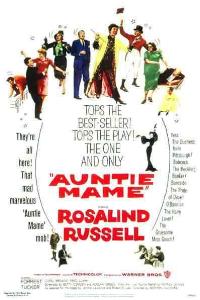Nonetheless, the text is sporadically entertaining, and it offers a wonderful showcase for the talented comedienne Rosalind Russell, who had also played the role on stage.
The movie tells in an episodic way the story of a rich, eccentric femme who adopts an orphan named Patrick Dennis (played by different actors at different ages) and introduces him to her intoxicatingly extravagant lifestyle.
In the process, he gets an ultra-liberal education, including exposure to homosexuality. In a marathon party scene, Patrick sees a gay couple, an aging pair of tweedy women.
The critic Richard Barrios has pointed out that, ideologically, the movie is trying to have it both ways. On the one hand, it contests traditional values through the lifestyle of the heroine, who, nonetheless, at the end of the film endorses decorum and mainstream norms,
“Auntie Mame” has been a favorite picture among gay cultists in each of its reincarnations, as book, stage play, big-screen picture, and TV Movie of the Week. Both in text and subtext, the film makes references to individuals and works admired and endorsed by gay men.
Thematically, the tale is very similar to Graham Greene’s “Travels With My Aunt,” which George Cukor filmed with Maggie Smith in the title role, in 1972.
Production values, particularly cinematography, sets, and Russell’s costumes are polished in a campy.
Stay away from the awful remake “Mame,” with Lucille Ball in 1974.
Cast
Mame Dennis (Rosalind Russell)
Beauregard Burnside (Forrest Tucker)
Vera Charles (Coral Browne)
Mr. Babcock (Fred Clark)
Patrick Dennis (Roger Smith)
Lindsay Wooley (Patric Knowles)
Agnes Gooch (Peggy Cass)
Patrick Dennis as child (Jan Handslik)
Gloria Upson (Joanna Barnes)
Pegeen Ryan (Pippa Scott)
Oscar Nominations: 6
Picture, produced by Jack L. Warnere
Actress: Rosalind Russell
Supporting Actress: Peggy Cass
Cinematography (color): Harry Stradling Sr.
Art Direction-Set Decoration (color): Malcolm Bert; George James Hopkins
Editing: William Ziegler
Oscar Awards: None
Oscar Context:
“Gigi” became the first Oscar-winning film to win awards in each of its 9 categories (hence they are not listed here). In 1958, “Gigi” was the only musical movie to vie for the Best Picture Oscar. The other nominees were: “Auntie Mame,” the Rosalind Russell stage vehicle; “Cat on a Hot Tin Roof,” adapted from the Tennessee Williams play; Stanley Kramer interracial drama “The Defiant Ones,” and the old-fashioned “Separate Tables,” based on the stage play from Terence Rattigan, adapted to the screen by him and John Gay.
Minnelli won the Directing Oscar at his second nomination (the first was for “American in Paris”). No actor from the musical was nominated for a legit Oscar his/her performance though vet Maurice Chevalier received Honorary Oscar.
While “Auntie Mame” and “Cat on a Hot Tin Roof” lost in each of their 6 nominations, “The Defiant Ones” won 2, and so did “Separate Tables,” for which David Niven won the Best Actor and Wendy Hiller the Supporting Actress.











